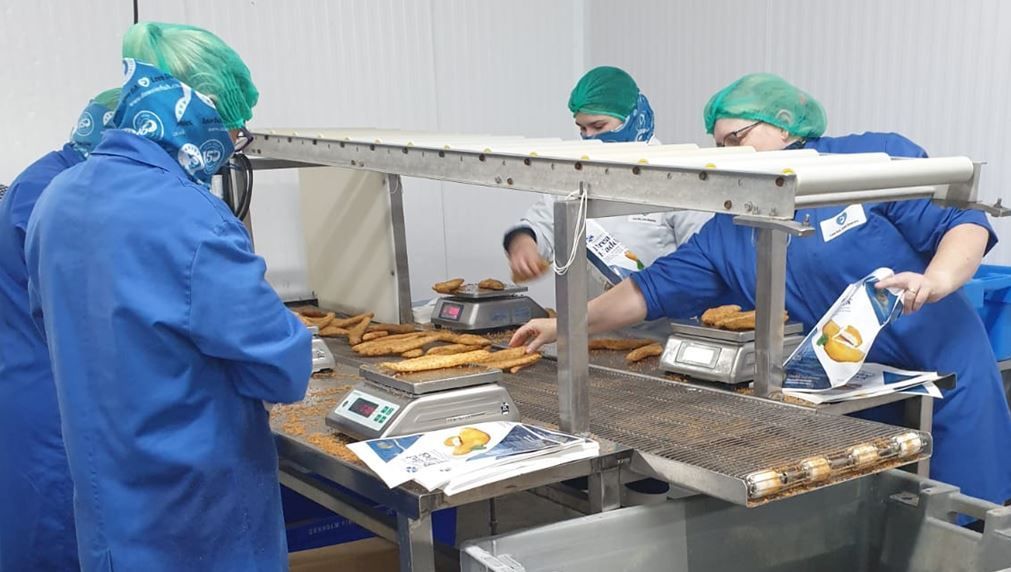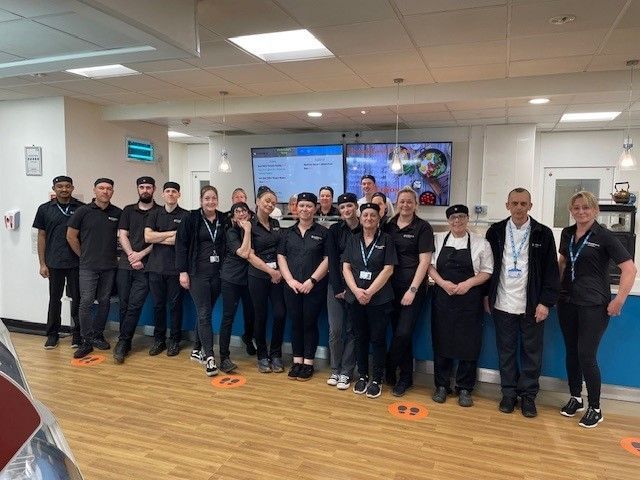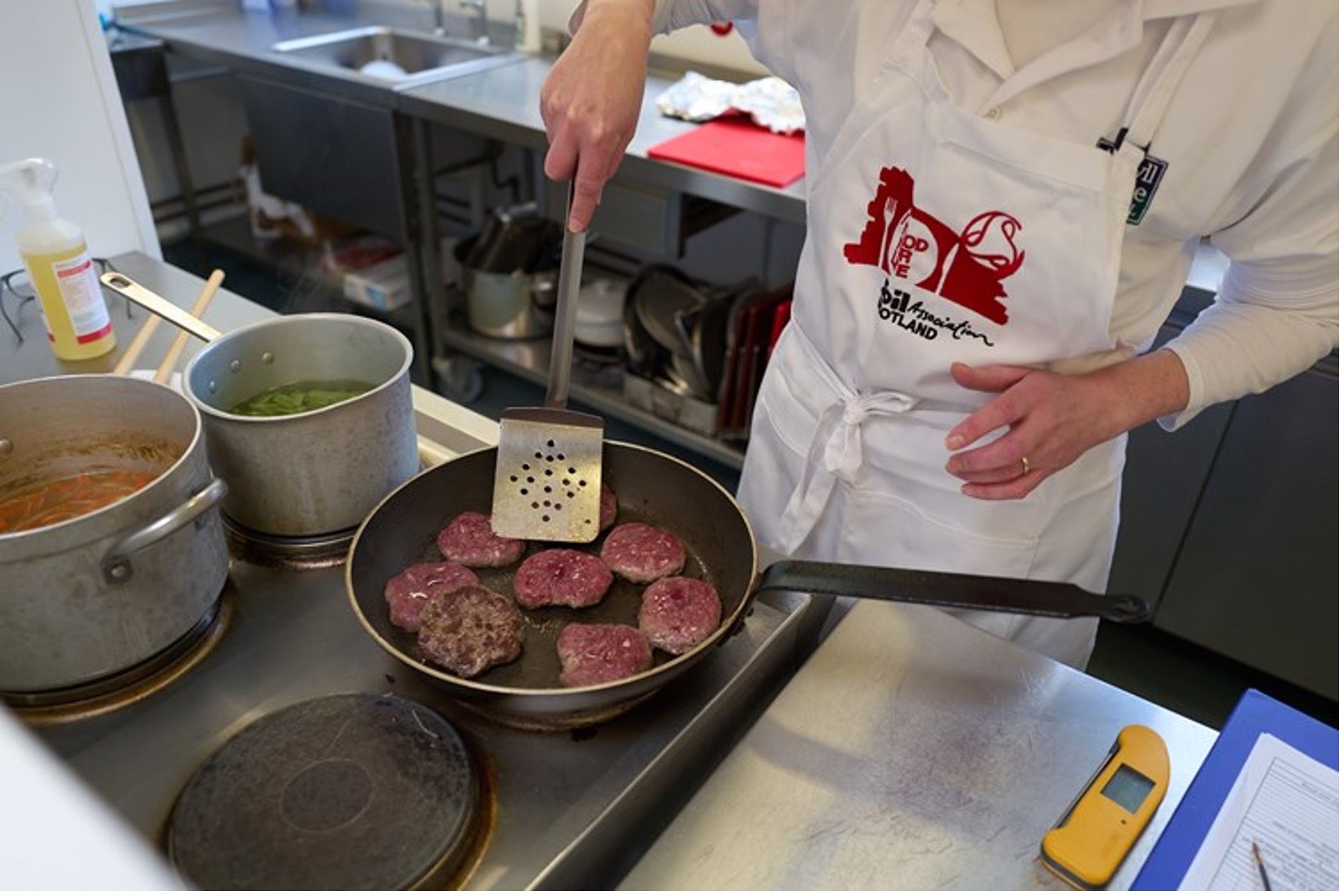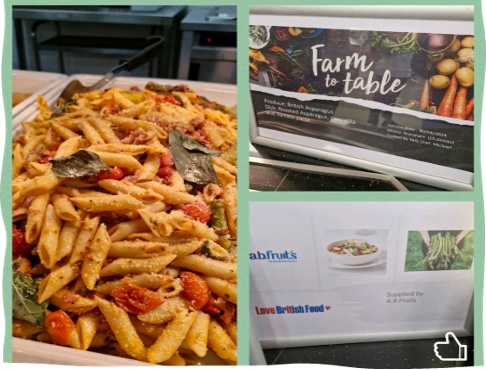An insider perspective on how ISS sources local, seasonal and British produce for hundreds of schools across England

Steve Kemp is the Sector Director for the UK ISS Education Catering team. He leads the operational and support teams and is responsible for both the people working within the ISS Education team, the development and growth of the education business, and ensuring that we deliver wholesome fresh food in welcoming and engaging environments every day, in every dining room.

Linda Cregan is the Food Services Director for the ISS UK&I Food Operations Performance team. She supports the operational teams and is responsible for the food development and nutrition strategy for the Education business, as well as leading well-being strategy across all ISS food service sectors, Education, B&I and Healthcare Retail.
Both Steve and Linda sit on the new Love British Food Schools Working Group.
Role and responsibilities
Steve
I have worked for ISS Education for over 10 years. Having initially trained as a Chef working with Michel Roux at the Waterside Inn in Bray, I moved into a Head Chef role with Sutcliffe catering and ultimately into the management arena where I now head up the ISS Education team as Sector Director.
Following a variety of roles supporting healthcare, business and industry and local government establishments I ventured into the Education sector joining Castle View in the mid 1990’s, which was then acquired by Compass Group in 2002 where I spent a further 10 years within the Chartwells Education team leading both Operations and Business Excellence functions.
I love working for ISS and within the school meal industry because it affords me the opportunity to influence, for the better, how and what our future generations eat. With so many challenges today around Obesity, Diabetes, Allergens etc… it is now more important than ever to guide and nurture our young customers on making healthy choices and developing a healthy lifestyle. ISS is very aware of this and supports and underpins these ethos’s to help ensure our culture is focused on the health & wellbeing not only of our customers, but of our colleagues, friends, and family to.
Linda
I have worked for ISS Education for 4 years. Having started my career working in restaurants in London’s West End, I moved across to school catering in 1999 initially with private contractors and then to Enfield Local Authority as Head of Service for Catering & Hospitality. In 2007, shortly after the Jamie Oliver TV programmes I was offered a position with the newly set up Government Quango, the School Food Trust, becoming CEO in 2013 when it became the Children’s Food Trust. I supported the development of School food standards and other Obesity and healthy food policies and legislation, was a member of the School Food Plan expert panel and Co-Chaired the School Food Plan Alliance.
Having spent many years campaigning for better food for all children, I was really excited to have the opportunity to move to ISS in 2018 when the Trust closed. They were an organisation I had worked closely with on several projects, and like me, believe that it is every child’s right, not privilege, to be able to eat a lunch that is freshly prepared every day using quality, fresh and seasonal ingredients.
How many schools are you responsible for and how do you work with them? Tell us about the schools: number of pupils / sites etc. What catering facilities do you have to support you?
ISS currently partner with around 450 primary schools and 50 secondary schools across England. They are a mixture of academies, local authority, and stand-alone schools, large and small, old, and new. We serve approximately 100,000 Food for Life served here accredited meals every day.
But we see our jobs as much wider than serving nutritious and healthy meals. Just as importantly, we support our schools to take a whole school approach to food, offering educational activities such as farm visits at our supply partner farms, cooking and nutrition sessions with our in-house Development Chefs and Nutritionists, and growing classes such as the Big Grow and Green Fingers which we deliver with Celebrity TV Gardener, Chris Collins. We also work in local school communities delivering bespoke and impactful social value activities and projects.
We want school food to become a true part of the school day; the nineth lesson, because working together in partnership with our schools, we know we can help shape our future generation on the path to achieve their full potential.
What is your budget per head?
Funding is agreed on a school-by-school basis. Currently, the Government allowance for UIFSM is £2.34 but like most caterers we do not necessarily receive that full funding. This funding has only increased once (by 4p) since the introduction of the policy in 2013. This of course brings challenges, particularly at the moment with inflationary and other cost increases that all catering providers are facing.
What is your farming hinterland and availability of produce in your area?
We use national supply partners Bidfood and NCB who work with a network of local producers, growers, and farmers to help us purchase and source local, seasonal, and British food from farms around the country. Having these supply partners helps us maintain a level of supply whilst reducing our food miles.
What was the catalyst for you looking to source British?
We are proud to have led the way as an early adopter of the Food for Life programme and were the first caterer to set the minimum standard of bronze food for life served here menus in all our schools. Mark Davies (who was MD of Education Catering at ISS until recently) also sat on the Food for Life Advisory Board for many years, so being able to offer fresh and sustainable meals to all our customers has always been a priority.
What have you achieved?
Home baked is always our first choice. At least 75% of our meals are cooked from scratch - that includes everything from sauces to desserts and tray bakes, from bread baskets to freshly prepared salads and healthy snacks. The food we serve in our schools is nutritionally balanced and compliant with the School Food Standards. We make healthier eating easier by reducing salt and sugar in our recipes, using more pulses and vegetables and whole grain ingredients as often as we can, and we don't use any undesirable additives, trans fats or GM ingredients.
As part of the For our Planet commitment in our health and wellbeing strategy, we have also aligned our food procurement policies across our business to the purchasing of certified ingredients with the highest ethical provenance to make sure we get great ingredients on the plate every time, so for example all our eggs are free range, our meat is sourced from UK farms with the highest welfare standards, and we are also a company partner with the marine conservation society.
Our extensive recipe database has a variety of dishes and concepts to suit lots of different tastes and cultures, and we photograph every dish so that we can show our teams in the kitchens just what the dish should look like.
We run an inclusive service and want every child to be able to eat a meal with us if possible. So, we take every step necessary to make sure all pupils are safe and have any specialist requirements they need catered for, whether that be providing easily accessible allergen information in our secondary schools or holding our younger customers by the hand and designing bespoke special diet menus for them.
Having all of this in place means that when it comes to designing our menus, we can give the flexibility to have something that works for every school.
What lessons and hot tips would you like to share with other school caterers?
Collaboration and partnership are key – with our producers, our farmers, our suppliers and most importantly our schools, their pupils, and their communities.
Schools are at the heart of their local community and our dining halls are an intrinsic part of that. If we can support our schools with a whole school approach to healthy eating, food education and sustainability, this enriches the lives of local families, and the impact is felt way beyond the dining hall.
But equally, we know that there is no nutrition in a meal that isn’t eaten, so being able to balance, climate, health and nature with affordability and popular options that children will want to eat is vital. Getting regular feedback from pupils and parents and then acting upon that feedback is vital. We hold regular tasting sessions and recipe and concept development sessions, and then use that to keep our offer fresh and innovative. A great example of this is our ‘Feed Your Eco’ offer in secondary schools that was developed as a result of pupil workshops to develop more plant-based recipes.
And finally, don’t forget about the experience. If you think about a restaurant environment, a great food offer will get us through the door, but it is the experience we have that makes the difference whether we go back. A school dining room is no different than any other restaurant. Now, more than ever, those experiences matter. Pupils and students have already missed far too many opportunities to learn those vital social and life skills during the pandemic and we have one of the best opportunities ever now to use food and our dining experience to help pupils and students reconnect with their friends and get back to normal school life. Supporting social skills, mental and physical well-being and encouraging children to eat a healthier diet has never been more important.
Any suppliers you would like to highlight?
As mentioned, we work very closely with Bidfood and NCB because they are bought into our philosophy on the importance of being able to balance climate, health, and nature, and they are equally committed to working alongside us and local producers and farmers to help us achieve and maintain our food for life served here status.
Both Bidfood and NCB have been tremendous during the pandemic in supporting us to make sure we continued to get healthy meals to children and their families, and we could not have done it without them.
Share:
You may also be interested in...








Slide title
Write your caption hereButton
Slide title
Write your caption hereButton
Slide title
Write your caption hereButton
Slide title
Write your caption hereButton

Slide title
Write your caption hereButton
Slide title
Write your caption hereButton
Slide title
Write your caption hereButton
Slide title
Write your caption hereButton
Don’t miss out!
Sign up to our newsletter and stay up to date with our latest news and events.
The campaign Love British Food, the national food celebrations ‘British Food Fortnight’ and their associated logos are trademarked and must not be used without the express permission of the owners, Love British Food. Companies or individuals wanting to use the logos or run promotions and activity in association with British Food Fortnight or Love British Food can work with Love British Food as a member or partner or with permission from the founder.
Love British Food


